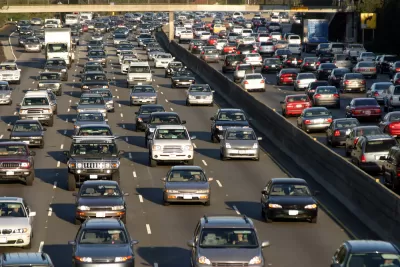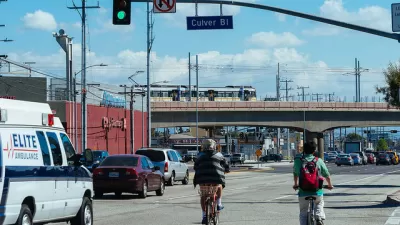If this solution from a regional planning agency gains traction, New York City may have some competition to become the first American city to implement congestion pricing.

The controversial proposal is one congestion-reducing solution proposed in the Southern California Association of Governments' 100 Hours campaign. Other strategies are more conventional, such as biking, transit, and rideshare.
The campaign calls it a "decongestion fee system," defined as "a mobility management tool that aims to combat the negative impacts of traffic and provide congestion relief. Drivers would have the option to pay for less congested arterial roadways during peak times when congestion is at its worst."
By charging a fee to enter and use the streets within a highly-congested area at peak periods [italics added], drivers would be incentivized to make more informed travel choices and explore mobility alternatives.
"Matthew Turner, a professor [of economics] at Brown University who has studied the effectiveness of various attempts to reduce traffic, and many other transportation researchers agree that charging a market rate to use the road is the most effective way to reduce congestion," reports Meghan McCarty Carino for KPCC (Southern California Public Radio, audio available) on the new campaign. "They argue that charging drivers more to go to a crowded destination downtown at rush hour would encourage some to avoid the trip or take it at a different time."
Non-residents would be charged a variable toll to drive through, say, West L.A. or Downtown L.A., said Association Executive Director Hasan Ikhrata. The revenues could be used to invest in more transit or in creating more space for walking and biking, he said.
The proposal bears some similarity to the Move NY plan, which would toll motorists who drive south of 60th Street in Manhattan. An introduction to the plan in the campaign's webpage (which has links to many interesting congestion pricing articles) compares the proposal to successful European cordon area congestion pricing programs:
In some of the most congested cities in the world, including London, Stockholm, and Milan, adding a decongestion fee system during peak hours has dramatically increased mobility, as well as improved public health and reduced traffic collisions.
But the idea proved too controversial for New York when then-Mayor Michael Bloomberg proposed it. And a similar proposal for San Francisco appears to have stalled. "It would require a big leap for the proposal to become reality," adds Carino for KPCC. "The Association of Governments can't make policy, and many politicians shy away from the idea of tolling, due to low public acceptance of the idea."
Hat tip to Jeff Wood of The Overhead Wire.
FULL STORY: Would London-style toll zones reduce LA traffic?

Maui's Vacation Rental Debate Turns Ugly
Verbal attacks, misinformation campaigns and fistfights plague a high-stakes debate to convert thousands of vacation rentals into long-term housing.

Planetizen Federal Action Tracker
A weekly monitor of how Trump’s orders and actions are impacting planners and planning in America.

Chicago’s Ghost Rails
Just beneath the surface of the modern city lie the remnants of its expansive early 20th-century streetcar system.

Bend, Oregon Zoning Reforms Prioritize Small-Scale Housing
The city altered its zoning code to allow multi-family housing and eliminated parking mandates citywide.

Amtrak Cutting Jobs, Funding to High-Speed Rail
The agency plans to cut 10 percent of its workforce and has confirmed it will not fund new high-speed rail projects.

LA Denies Basic Services to Unhoused Residents
The city has repeatedly failed to respond to requests for trash pickup at encampment sites, and eliminated a program that provided mobile showers and toilets.
Urban Design for Planners 1: Software Tools
This six-course series explores essential urban design concepts using open source software and equips planners with the tools they need to participate fully in the urban design process.
Planning for Universal Design
Learn the tools for implementing Universal Design in planning regulations.
planning NEXT
Appalachian Highlands Housing Partners
Mpact (founded as Rail~Volution)
City of Camden Redevelopment Agency
City of Astoria
City of Portland
City of Laramie





























